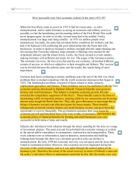The idea of political policy itself is an interesting one, as after Hitler gained the power to rule by decree, there was no sense of a political compromise when making policies, as Hitler could do whatever he wanted, though his alleged apathy towards much of politics, especially domestic matters meant that what was introduced was often along the lines of being 'the will of the Fuhrer'. This meant that political policy followed a more consistent theme than social and economic aspects, as it was more controlled in its use, as well as being less complicated by other considerations the government had to make. There were of course certain contradictions in policies that the Nazis followed, but in general, they followed a general trend in their aims, following Hitler's principles such as lebensraum, volksgemeinschaft etc.
In the social sphere, Hitler's ultimate aim was of course to create his master race, and social policy was geared towards this. However, in the early years Hitler found it more necessary to make the social changes needed to generate changes in Germany that would turn the economy around and make people happier, and more content with their government, in order for the Nazis to consolidate power. In order to passify the people and make them more receptive to Nazi ideology and propaganda, Hitler's social policy began as a set of policies which sought to improve the economy, increase the number of people taking part in party activities, and to expand the master race. This was to be the general direction of Nazi social policy, including several measures to weed out undesirables from the gene pool. Euthanasia, deportation and persecution of non-Ayrian races and other such oppressive measures. Measures such as giving medals to mothers who bore large numbers of children were not a policy as such, but reflected the Nazi ideals of a strong sense of family and traditional values. Groups like the Hitler youth and Strength Through Joy were part of the social policy of indoctrination of the German people in order to create a volksgemeinschaft.
The economy was a vital tool of the Nazi government, and had to be used carefully to aid the aims of the party, as well as ensuring the wellbeing of the nation. Due to this, there was a great deal of inconsistency in the way Nazi economic policy was shaped. Initially, the economy was given a much more loose leach than other areas of Germany, as the government needed it in order to solve the instability, unemployment and other economic issues on which they had partly been elected. Companies which had been supportive of the party and remained supportive, such as IG Farben and Krupp gained large contracts and assistance from the government, and this heavy investment through fiscal policy pushed the economy into growth. Later on, the Nazis moved more towards controlling the means of production through the drive for autarky and through state owned entities such as Reichwerke Hermann Goering. Private companies were also 'persuaded' to put money into these projects to reduce the strain on German funds, and this helped the level of investment in Germany, as well as reducing the strain on the treasury. There was a greater pervasion of Nazi ideals into the economy after the switch from guns to butter was made. Once the economy was geared towards war production, the Nazis took greater control over what private companies did, as well as placing state controls on the factors of production.
Perhaps the reason for a lack of absolute consistency in Nazi policy is the lack of an absolutely consistent decision making process. The general ideological base among the key Nazis was the same, but the individual natures of the different party members meant that the way policies were implemented, as well as their content, varied. The Nazis had abandoned the democratic foundations of the Weimar republic and used the emergency powers to rule by decree most of the time. However, Hitler was largely apathetic, so much of the legislating came from within the party and government, often following what was believed to be the 'will of the fuhrer', but due to the lack of coordination and confusion (there were 4 departments all doing the job of the Reich chancellory), different policies from different departments invariably showed inconsistencies. There was a general shape to policy, following the Nazi ideology, and dictated by Fuhrerprinzip. However, the complex nature of Nazi Germany's government, combined with the need to bend to the will of the people occasionally as well as other necessities led to inconsistencies between individual policies.








